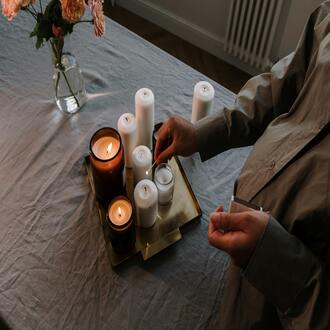Transcription Beliefs
Psychology establishes a periodization of human development, those stages through which the individual transcends, involving the assumption of roles and attitudes, either through introspection or through belonging or not to social groups. Limiting beliefs, validated by public opinion or reproached by a slightly outdated vision of normality, construct us as passive and inert beings, without the option of granting meaning and imposing ¨action¨ to our internal experiences. In this section we will analyze to what extent the unconscious beliefs adopted since childhood are measurers of our actions, as well as the different basic ways in which a belief can be "disguised".
When does a belief arise?
When do you think you started acquiring a belief? 15 years old? 20 years old, maybe? Well, no, it started earlier. Much earlier. In the prenatal period, being connected by the umbilical cord to your mother. Mother who contributed only to provide you with food? No, you were also influenced by her emotions. If she was sad, tired or angry you reacted to it, the only difference is that you were still unaware of it. A baby, in its neonatal period, is able to sense its mother's discomfort. Then they begin, over the years, to perceive and generate more rational ideas about emotional language and to create habits of behaviors marked in the category of socially correct.
Attitude-values-beliefs.
Where do you think the "instinct or need" to play house, or mommy and daddy comes from? Firm representations of what they see every day, and while they check their reality they reproduce in detail the behaviors and attitudes that other people have towards them. In his book ¨People Puzzle¨, Morris Massey establishes a values-beliefs adequacy, admitting the connection we establish with those values. If a child reproduces a peaceful attitude while playing school, we can affirm that he receives the same treatment from his teachers. Children imitate what they see, and they act in the same way without having any notion of the intentional motive, thus occurring with the beliefs they adopt.
Morris Massey, recognizes that the habits and attitudes that we reproduce will remain stigmatized in their essence until an approximate age of 7 years. At this age, they will not question and will accept the parental and/or family ideology without complaining. This is why it is so important to monitor these beliefs from an early age.
The age from 8 to 14 years will be delimited by their reasoning. Therefore, it is key to monitor certain attitudes that parents are inculcating in them, in order to redirect these guidelines. Beliefs, as thoughts or systems of thoughts that are passively internalized, can and should be identified and released through experience, where they are consolidated.
On the other hand, we confer to genes an almost absolute power over our human condition. We say: "I have a strong character because my whole family has been like that for as long as I can remember". Without stopping to reflect on whether this statement is true or not. Just like behavior, diseases are physical symptoms of our negative thoughts and emotions. Do you know what the primary function of the mind is? To strike a balance between what we want and what we do. You don't want to get sick, but when you think about it, your mind believes that you do and it does. Bruce Lipton in his book "The Biology of Belief", forces us to reflect on the question: Are we victims or is our biology a firm adaptation to our beliefs?
Types of beliefs.
Due to its imperious necessity, in the last video of this topic, we will work in depth on all the limiting or useless beliefs. At this moment we specify their basic typologies:
- In a first type we have a limiting one: our capacity. Am I able to conquer a boy? Am I able to pass the entrance exams to the university? Write a book? No thanks, I don't think I can write that much, I'll continue to settle for writing stories of one page each. Hidden in our sense of capability is a reflection of who we are and what we can do or what we have been taught we can do to avoid ridicule or disappointment.
The second type of limiting belief is linked to the remote possibility of achieving something. It is more frequent than we think when, for example, we say to ourselves:
- I would love to get a career promotion but moving up the career ladder is a very complex task. I don't have the time and energy. Everything we "excuse" and believe can hinder us in our day to day life. It is a plot of your unconscious. Excuses are the result of an unfounded bad habit. Start a simple habit, apply discipline and perseverance, propose goals, secondary objectives and thus increase your self-confidence. You remember to do it, don't you?
The third type of belief is the deserving. And we instill this system of thought when we settle for an exploitative job, without rest or care for the rights of the worker, blaming ourselves for not having learned a professional competence and having abandoned our studies too early. You punish yourself and assume that you do not deserve a decent salary, with comfortable rights and where you can show your tastes and hobbies. The same thing happens when we get married and start a family with the last man who came along and gave us the hopeful idea of never being alone again. You deserve companionship, not affection and passion in your life, right?
beliefs




